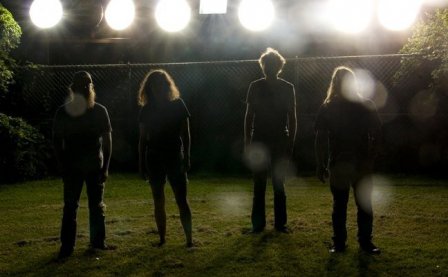By now, the idea of dreams as sleep-preserving wish-fulfilments is surely old news. One of the more defensible of the Freudian speculations, it feeds into the popular notion that aspirations and dreams are fundamentally positive constructs with the important function of directing us towards satiety or “completion.” Yet the obvious flipside of this, of every conjured glass of water, beautiful (wo)man, or Chinese yuan, is that it involves a negational view of the self, one that frames and constitutes that self entirely in terms of deprivation, lack, and absence. On such an insidious side-effect, there was little comment from the cocaine abuser himself (at least not in The Interpretation of Dreams), which means that the best we can do as a mere cheerleader for consumables is to point you towards an album. Luckily, however, Recurring Dream is a fitting aural substitute.
That’s because Recurring Dream, the second LP from Chicago quartet Implodes, balks at casting the stuff of fantasy as even remotely constructive, remedial, or salubrious. From the very outset, from the funereal dronescape of opener “Wendy 2,” with its pregnant, looming clouds of synthesizer, all dreams are equated with the breed of purgatorial nightmare, where an already obscure object is dissembled even further behind a thick membrane of smog. And while Freud argued that the censorial distortion inherent to dreams could be deciphered by the savvy psychoanalyst, it seems that Implodes are much less sanguine about their prospects. Songs such as “Scattered in the Wind” and “You Wouldn’t Know It” articulate, in their frictional marriage of fuzzed-out guitars, mantric percussion, and keening synths, a conception of dreams as a Trojan horse for alienation, dissipation, and abstraction, as a usurper of any sober grounding the individual may’ve had in their own needs and identity.
The oneiric motifs don’t end there either, since throughout its 44 minutes, the record is submerged in the familiar tropes of reverb-heavy guitars, unintelligible susurrations, and dysphoric minor chords. Yet that’s not to say that there isn’t more to the band’s modus operandi than what you’re likely to find buried in the murk of any “dream-pop” or “shoegaze” dirge. Furnishing extra color and vividness are the heavily-filtered leads of guitarist/vocalist Matt Jencik, which periodically ascend from the miasma to supply an uncannily lucid counterpoint. These emanations, exemplified in the propulsive turbulence of “Necronomics” and the fatalistic languor of closer “Bottom of a Well,” are rendered in the kind of higher frequencies that can also be heard in the band’s synths, lending the relevant crescendos an almost synthetic and hyperreal quality, one that dramatizes how the cruel pathos of our unwaking lives is often generated by the dissonance between their false promises of clarity and the ambiguities in which they almost always culminate.
Another font of Recurring Dream’s difference from the sea of young pretenders are the excursions it makes into ambient territory, with “Zombie Regrets” and “Dream Mirror” being two brooding yet no less penetrative collages of undulating electronic pulses and swells. In fact, it wouldn’t be too cavalier to tag even the more stereotypically “rock” numbers as ambient in their underlying approach, since despite their constant use of drums, of insistent hypnagogic rhythms, and of the occasional quiet-loud paroxysm (witness “Ex Mass” and “Melted Candle”), they generally cleave to the same harmonic tempo throughout their concise running times, rarely modulating from one tonic to another and rarely evolving into an alternative chord cycle. This fixity may arguably qualify the album as a figurative complement to the observation that dreams and other related phenomena (i.e., myth, hopes, rationalizations) offer only the illusion of movement and release, yet at the same time it inflicts the music with its major weakness, which is that its dearth of progression, its structural inertia, precludes it from being consistently rewarding.
That said, the absence of transportation and deliverance is ultimately what enables Recurring Dream to realize its pessimistic vision of the confused mechanisms we use to delude ourselves into thinking all is well, and despite its conceptually-necessitated limitations, the album is not short of moments of resonance and emotional impact. It just remains to be seen whether Implodes can expand on their burgeoning repertoire in the future, since otherwise we’ll be forced to satisfy ourselves with yet more dissatisfying dream-work.
More about: Implodes


